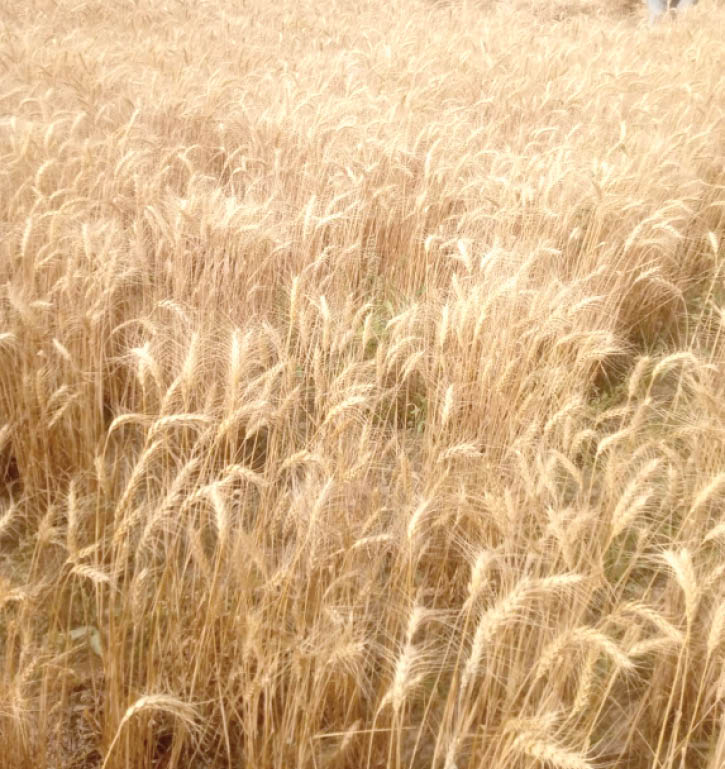How climate change affects wheat production in Jigawa, Yobe
Research has demonstrated that majority of food crops are producing less due to climate change, which is caused by rise in temperature and altered rainfall patterns. Farmers in the North, particularly those from Borno, Bauchi, Yobe, Jigawa, Kebbi, Taraba, Kano, Adamawa, Zamfara and Sokoto states produce majority of these food grain crops: rice, wheat, millet […]

one of the affected wheat farms in jigawa
Research has demonstrated that majority of food crops are producing less due to climate change, which is caused by rise in temperature and altered rainfall patterns.
Farmers in the North, particularly those from Borno, Bauchi, Yobe, Jigawa, Kebbi, Taraba, Kano, Adamawa, Zamfara and Sokoto states produce majority of these food grain crops: rice, wheat, millet and maize.
It has been determined for more than 10 years that rising temperatures in Yobe and Jigawa states pose a serious threat to wheat production. Wheat yields and stability decreased due to climate change, which also had an impact on many plant species due to high temperatures.
Daily Trust on Sunday discovered that wheat-rainfed areas in Yobe and Jigawa states are more vulnerable to variations in rainfall patterns, which have a direct impact on output.
- Why farmers should ignore deceit on GM crops – Rose Gidado
- Bauchi fights quelea birds, allots N45m for pest control
Birniwa, Guri and Kirisamma local government areas in Jigawa State share borders with Nguru, Bade and Machina in Yobe.
Farmers in the areas told Daily Trust on Sunday that wheat cultivation requires a cool climate and medium rainfall and the ideal temperature needed in winters for the production for the production of the crop is 10 to 15 degrees Celsius, while the ideal temperature needed in summers for the production of the crop is 21 to 26 degrees.
Lawan Abdullahi, a wheat farmer in Munzarau village, Kirikasamma Local Government Area, told Daily Trust on Sunday that climate change had affected their crop yield due to high temperatures and unpredictable cool climate patterns.
‘‘Our farming this year has numerous challenges, especially unpredictable cool climate patterns, delaying the sowing of wheat. These have significantly impacted our yield.
‘‘When the sowing date is delayed, it results in reduction in the growth and development of plants. This exposes wheat to low temperatures during the growth. You know what crops need to be sowed in a cool climate so that they will germinate.
‘‘When I harvested my wheat I discovered that what I counted was loss. I used to cultivate 40 to 50 bags of wheat annually, but this year, I only harvested 32 bags due to high temperatures and unpredictable cool climate patterns,’’ he said.
Another farmer, Hamza Yahaya in Tandanu village under Hadejia Local Government Area in Jigawa State, said some of the farmers were delayed to sow the wheat as a result of high expectations of inputs from the government.
‘‘Farmers are used to sow their wheat crops on time to meet the atmosphere condition of their land. So this time around, both the state and the federal government promised to provide farm inputs to farmers at an affordable price.
‘‘Many wheat farmers were delayed to sow their crops and invest their money in the farms, waiting for government’s intervention because of these promises made by both Jigawa State and the federal government, but unfortunately, that promise wasn’t fulfilled by either.
‘‘When they discover that government’s promises on inputs would not be fulfilled as they were told, they started buying and sowing the crops when most of them were delayed.
‘‘Borno, Yobe, Jigawa and Adamawa are the areas with high temperatures, and wheat grows best when the temperatures are warm but not too hot. The most supportive weather to wheat is cool conditions, but this time around, it didn’t give wheat what it needed. That is why a lot of them have counted lost,’’ he said.
Another farmer, Abubakar Ibrahim in Bade Local Government Area of Yobe State, told Daily Trust on Sunday that wheat needs a lot of sunshine, especially when the grains are beginning to fill out, but the cool climate didn’t support it.
‘‘A lot of people were complaining that wheat yield wasn’t encouraging this time around. But one of the two things I wanted people to know is that cool climate and sunshine are the greatest things that germinate crops.
‘‘The cool climate didn’t come early and there is a mixed condition of the weather. Sometimes you will discover that the cool has gone while the high temperature is around, later on after two weeks, cool will come back when the hot is no longer available and you know what prepared cool than hot,’’ he added.
Malam Umar Muhammad, a wheat farmer in Nguru Local Government Area of Yobe State, said the high price of inputs and climate change had contributed immensely to farmers’ losses.
‘‘The price of one bag of fertiliser now is between N45,000 and N46,000, and one liter of fuel is N700. This is how we are running our wheat farms. There are a lot of farmers who planted their crops but failed to harvest them because the price of inputs has increased.
‘‘Prices of inputs and climate change are the major factors that brought this poor yield. Inputs alone without cool weather won’t grow your plants. Also, cool and sunshine alone without enough fertiliser and chemicals will never germinate your wheat,’’ he said.
